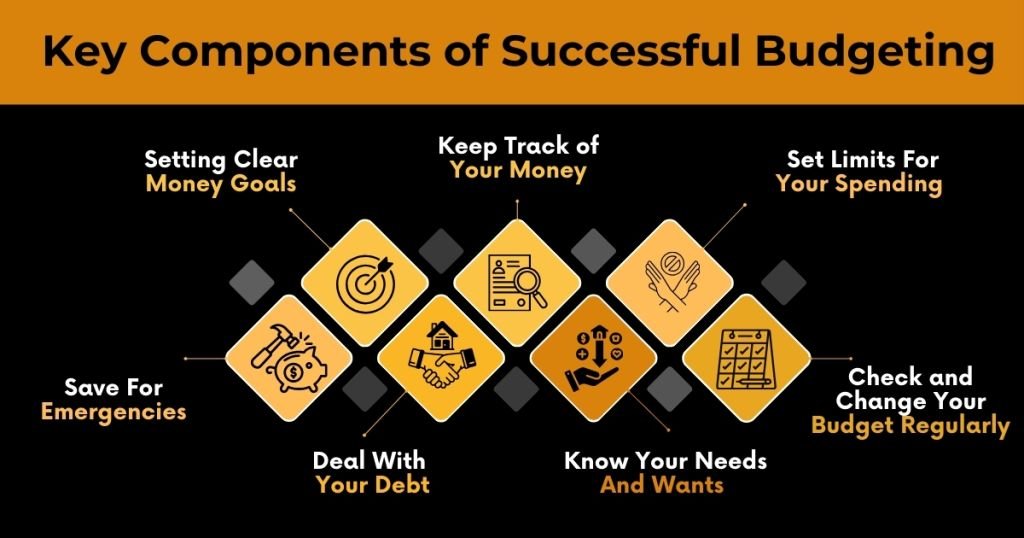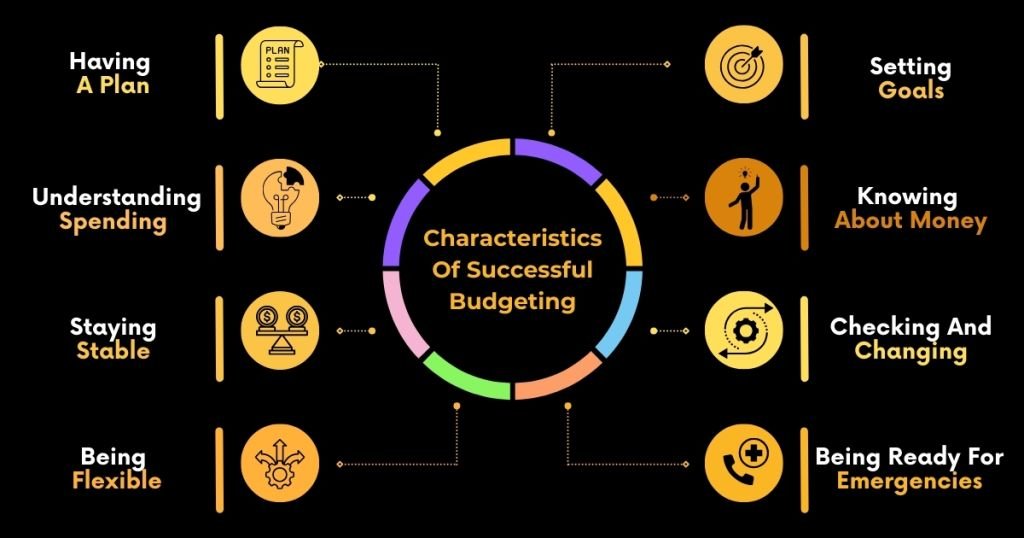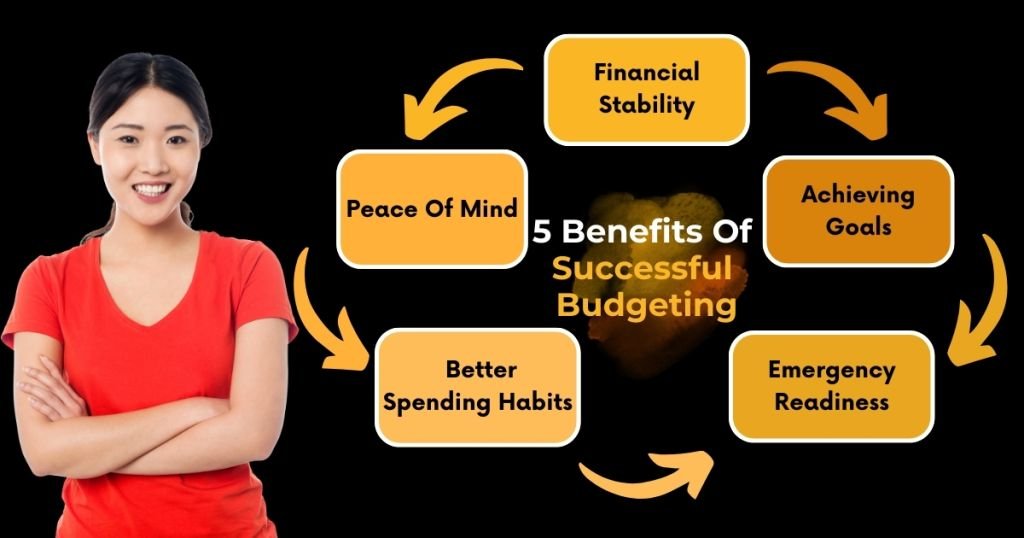The key components of successful budgeting is like a roadmap for your finances, guiding you towards your financial goals and helping you manage your money wisely. However, successful budgeting isn’t just about jotting down numbers—it involves a strategic approach that considers various factors.
According to Dave Ramsey “A budget is not just a collection of numbers, but an expression of our values and aspirations.”
A good budget helps you manage your money better. It helps you choose what’s important to spend on and think about your future money goals. But sometimes people make budgets and then stop following them after a few weeks. If you want to keep to your budget and save a lot of money, these key components of successful budgeting can help.
Key Components of Successful Budgeting

1. Setting Clear Money Goals
Setting clear money goals is the first step in successful budgeting. These goals act like guiding lights, helping you navigate your financial journey. Whether it’s saving for a house, planning for retirement, or paying off student loans, clear goals help you make smart decisions and keep your finances stable in the long run.
When you have specific things you want to achieve with your money, it helps you understand how managing it well benefits you later on. For instance, if you plan to save $500 every month, you might realize how canceling a $20 monthly subscription can make a big difference.
2. Keep Track of Your Money
Tracking your income and expenses is important for budgeting, helping you grasp your financial status. In addition, by monitoring your spending, you identify areas for savings and ensure realistic financial choices. Understanding your financial flow motivates job growth and spending cuts, enhancing your financial health.
3. Set Limits for Your Spending
Understanding the key components of successful budgeting involves determining spending limits for various areas, preventing overspending, and maintaining financial balance. Setting these boundaries ensures prudent money management, safeguarding overall financial well-being.
4. Save for Emergencies
Building an emergency fund is a big part of budgeting. It’s like a safety net for unexpected expenses, like sudden medical bills or home repairs. Having an emergency fund gives you peace of mind and makes sure your budget stays on track, even when life throws you a curveball.
5. Deal with Your Debt
Paying off debt is key for managing your money well. With a good plan, you can focus on reaching your financial goals instead of just paying what you owe. Too much debt can hold you back from your money goals, mainly because of high interest rates.
It can also make you spend money badly and get extra charges. Paying off debt smartly leaves you with more money later. You can start by putting all your debts together and paying off the ones with the highest interest first to get rid of debt faster.
6. Know What You Need and What You Want
It’s important to understand the difference between things you need and things you want when it comes to spending money. Furthermore, successful budgeting means focusing on what you really need, like food and shelter, while also recognizing things you could do without or find cheaper alternatives for.
7. Check and Change Your Budget Regularly
Your financial situation can change over time, so it’s important to regularly check and adjust your budget. This helps you stay on top of your finances, adapt to any changes in your life, and make sure your budget continues to work for you.
Characteristics Of Successful Budgeting

1. Having A Plan
Good budgeting is like having a map for your money. In addition, it tells you where to spend, save, and invest, guiding you toward your financial goals. Just as a map helps you find your way, a budget ensures you make smart decisions with your money, making your journey to financial success clearer and easier.
2. Understanding Spending
Knowing where your money goes is key. By tracking your spending, you can find ways to spend less and save more. Furthermore, it’s like having a map for your money – you can see where it’s going and make changes to reach your financial goals, like buying a house or paying off debt.
3. Staying Stable
A good budget keeps your finances strong, so you can pay bills on time and save for the future. For instance, it helps you handle money well, avoiding late fees and keeping a good credit score. This way, you’re ready for unexpected expenses and feel less stressed.
4. Being Flexible
It’s important to be flexible with your budget to stay financially healthy and reach your goals. Life changes a lot – like getting more money or unexpected costs. So, adjust your budget regularly to match what’s happening now. This helps you use extra money wisely and deal with any money problems, so you stay on target and feel less stressed.
5. Setting Goals
Goals are important for budgeting. A budget helps you reach goals like buying a house or paying off debt. It’s like a map that shows you how to get there. When you set clear goals, you can spend and save in ways that help you reach them. You can track your progress to make sure you’re doing well financially.
6. Knowing About Money
Knowing how money works is important for making good budgets. If you understand money, you can make smart choices about saving, spending, investing, and handling debt. Furthermore, this helps you create a budget that matches your goals, makes the most of your income, and cuts down on spending, so your finances stay strong over time.
7. Checking And Changing
Keeping an eye on your budget and making changes when needed is essential. However, it helps you stay on track with your money goals and use your funds wisely. By regularly checking your budget, you can adjust your spending to make the most of your money and keep moving forward towards your financial objectives.
8. Being Ready For Emergencies
Good budgeting means having money saved for emergencies, like when your car breaks down or something in your house needs fixing. This emergency fund acts as a safety net, keeping unexpected expenses from messing up your budget..
5 Benefits Of Successful Budgeting

1. Financial Stability
A good budget helps you save and invest more money. Furthermore, having savings can make you feel more secure and less stressed about money. A budget can also help you have a smoother retirement and avoid getting deeper into debt.
2. Achieving Goals
Reaching your goals can make you feel good and encourage you to set even bigger ones. However, by sticking to your budget you can save up for things like vacations, down payments, or a better retirement. In addition, a budget helps you keep more of your money and make progress towards your goals.
3. Better Spending Habits
A budget makes you track your expenses and stay on top of them. This makes you think twice before spending money unnecessarily.
4. Emergency Readiness
Emergencies can happen unexpectedly and bring unexpected expenses. However, having extra money saved up can help cover urgent repairs or essential purchases without breaking your budget. Being prepared for emergencies reduces the need for uncomfortable changes in your lifestyle or taking out loans.
5. Peace Of Mind
A successful budget can ease your worries about money. In addition, saving, investing, and managing your expenses can help you build wealth and work towards financial freedom. A budget can be the first step towards getting out of debt and feeling more secure about your finances.
Final Thoughts
Mastering budgeting involves incorporating the key components of successful budgeting: planning, discipline, and adaptability. However, by incorporating these key components into your budgeting strategy, you can take control of your finances, reduce financial stress, and work towards achieving your long-term financial goals. Remember, budgeting is not a one-time task but a continuous process that evolves with your financial journey.
Becoming really good at budgeting is like a journey. Furthermore, it helps you make smart choices about your money. For instance, this journey helps you reach financial freedom, making sure you have enough money for what you need. Good budgeting isn’t about sticking strictly to a plan. It’s about adjusting as you go along with your money situation.
FAQs
Why are Budgeting and Forecasting Important?
Budgeting and forecasting are really important for planning your money. They help you make a plan to keep your finances stable and successful in the long run.
How often should I change my budget?
You should update your budget regularly, especially when big changes happen in your money situation or what you want to achieve.
What’s a good way to tell what expenses are important and what aren’t in my budget?
Sort your expenses into groups based on what you really need. Then, focus on paying for the things you need most to make your budget work well.
What does having an emergency fund do for my budget?
An emergency fund is like a safety cushion for your money. It helps you stay financially secure when unexpected things happen, which helps your budget stay on track.
